SUPREME IRONY OF 'SCARFACE' ENDING
APPEARS TO BE LOST ON AN ENTIRE GENERATION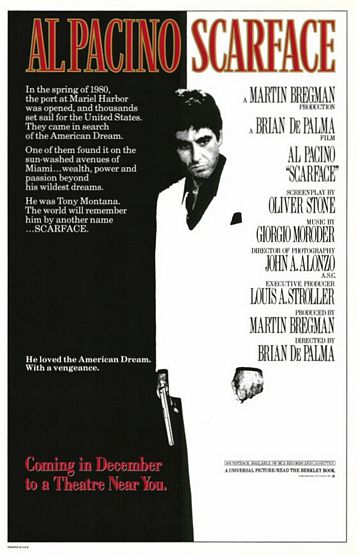 The Hollywood Reporter's Boyd van Hoeij
The Hollywood Reporter's Boyd van Hoeij reviews the new documentary,
Jack Pettibone Riccobono's
The Seventh Fire, which premiered at the Berlin International Film Festival the other day. Presented by
Terrence Malick, and executive-produced by
Natalie Portman, the film follows "the hardscrabble lives of two men on the White Earth Reservation in Minnesota" for several years, according to van Hoeij. "The first couple of reels are very loosely structured," van Hoeij states, "with no one identified onscreen, which gives the film a verite edge but which also means that it takes a good while for the material to find its footing and make it clear what and, more importantly, who, the film is exactly about.
"The feature’s protagonists finally turn out to be Rob Brown, in his thirties, and Kevin Fineday, who’ll be 18 when the film ends. They are, respectively, a criminal with (as per the press notes) ties to the Native Gangster Disciples gang and his young and unofficial protégé of sorts, with the initially scrawny Kevin looking up to the hulking Brown, who’s been to prison already five times. Kevin, called a liar and worse by several others around him, admits on camera he’s torn between the idea of becoming a big drug dealer and 'doing something somewhat the right way,' though for the moment, he described himself as a 'middle man, for weed, pills, meth, whatever,' and says that’s pretty much his 'job until further notice'. In one of the film’s strongest scenes, which would have deserved a bit more prominence, Brown tells Kevin that he already spent 12 years in jail and Kevin’s only 15 years old. 'Don’t be like me and get used to it,' he says, though at that very moment, Kevin’s just told Rob he hopes he’ll get his first plea bargain.
"Brown, meanwhile, has impregnated his girlfriend of three months before he’s off to jail for another 57 month stint and Kevin has even followed his example in this respect, knocking up a girl who then lost the baby a couple of weeks into her pregnancy. She blames herself, saying she 'messed up' (not quite the term she uses) birth control and has since broken up with Kevin over the fact he 'messed' -- more f-words used here -- with several drugs deals for her, each time adding salt to the meth he’s selling so as to increase the weight. Clearly, any idea of a connection or some kind of affection between these two human beings seems far-fetched; Brown, despite the fact he’s about to miss out on the first two-and-a-half years of his daughter’s life, seems a little -- but just a little -- luckier in that respect.
"What thus emerges, initially in fits and starts but then more forcefully as the film builds and the relationships crystallize, is a picture of life in the reservation community of Pine Point (or 'P-Town') as a place where lying and cheating, scoring and selling drugs and a host of other criminal activities are the order of the day and something as normal as love and human warmth are in short supply, with even the rapport between Kevin and his father feeling distant. Drug use is filmed with an unflinching eye (though some of this footage is not as high-definition as the rest) while posters on the walls in the background attest to an unoriginal and unhealthy obsession with the Brian De Palma version of Scarface, which seems to have made being a gangster super cool, suggesting exactly none of the people of an entire generation watched the film al the way through until it’s bloody, tragic and supremely ironic ending."
 Thanks to Matthew for sending in these two captures from the Saturday Night Live skit, "A Very Cuban Christmas." The skit, which you can watch on Hulu, originally aired on the December 20th episode. It's a big irreverent jumble thrown together after the U.S. and Cuba made a joint announcement three days earlier that they planned to work together to re-establish diplomatic relations. SNL cast member Kyle Mooney played Tony Montana, with that week's host, Amy Adams, as Elvira. The fictional Montana spouts the fictional declaration that "the best news is, the embargo of Cuba has been lifted. Tell 'em what that means, baby!" Elvira replies, "First we get the money, then we get the cell phone, then we get the Walmart." Tony then says, "That's right! Now why don't you say hello to my little friend-- it's Elian Gonzalez, and he's all grown up!"
Thanks to Matthew for sending in these two captures from the Saturday Night Live skit, "A Very Cuban Christmas." The skit, which you can watch on Hulu, originally aired on the December 20th episode. It's a big irreverent jumble thrown together after the U.S. and Cuba made a joint announcement three days earlier that they planned to work together to re-establish diplomatic relations. SNL cast member Kyle Mooney played Tony Montana, with that week's host, Amy Adams, as Elvira. The fictional Montana spouts the fictional declaration that "the best news is, the embargo of Cuba has been lifted. Tell 'em what that means, baby!" Elvira replies, "First we get the money, then we get the cell phone, then we get the Walmart." Tony then says, "That's right! Now why don't you say hello to my little friend-- it's Elian Gonzalez, and he's all grown up!"




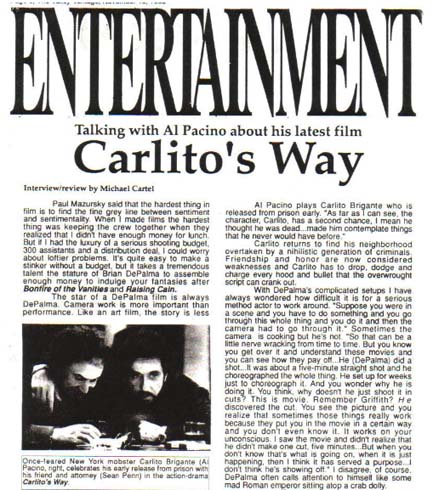 Michael Cartel, whose 1982 movie, Runaway Nightmare, was remastered and released on Blu-ray last year, was not a fan of Brian De Palma's Carlito's Way when he interviewed Al Pacino upon the film's release. Cartel
Michael Cartel, whose 1982 movie, Runaway Nightmare, was remastered and released on Blu-ray last year, was not a fan of Brian De Palma's Carlito's Way when he interviewed Al Pacino upon the film's release. Cartel 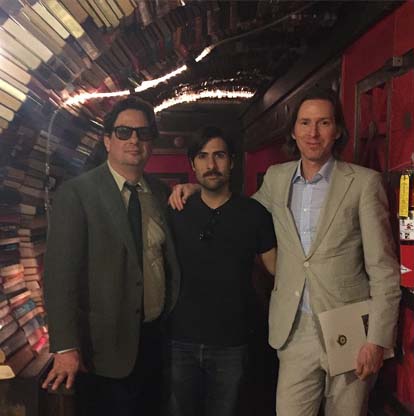 Pictured here from left-to-right are Roman Coppola, Jason Schwartzman, and Wes Anderson, posing last month at
Pictured here from left-to-right are Roman Coppola, Jason Schwartzman, and Wes Anderson, posing last month at  Brian De Palma's Phantom Of The Paradise will screen at 8:30pm this Thursday, February 12th, as well as 6:10pm Sunday, February 15th, at the BFI (British Film Institute). "As outlandish today as it was four decades ago," reads the BFI event description, "De Palma’s Faustian riff on The Phantom of the Opera is perhaps his most idiosyncratic work. When a brow-beaten composer has his cantata stolen by a demonic music tycoon, he’ll stop at nothing to see his music performed by the woman he loves. A musical phantasmagoria unlike anything you’ve ever seen."
Brian De Palma's Phantom Of The Paradise will screen at 8:30pm this Thursday, February 12th, as well as 6:10pm Sunday, February 15th, at the BFI (British Film Institute). "As outlandish today as it was four decades ago," reads the BFI event description, "De Palma’s Faustian riff on The Phantom of the Opera is perhaps his most idiosyncratic work. When a brow-beaten composer has his cantata stolen by a demonic music tycoon, he’ll stop at nothing to see his music performed by the woman he loves. A musical phantasmagoria unlike anything you’ve ever seen." This month, the
This month, the 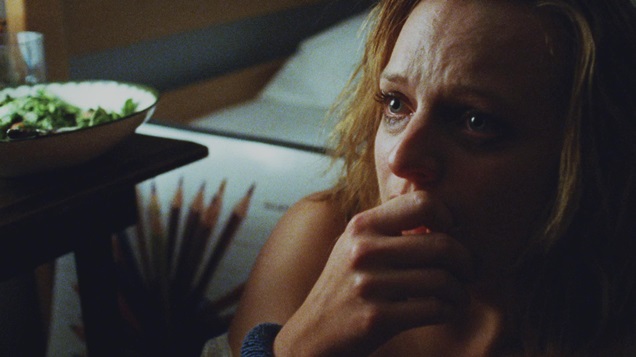

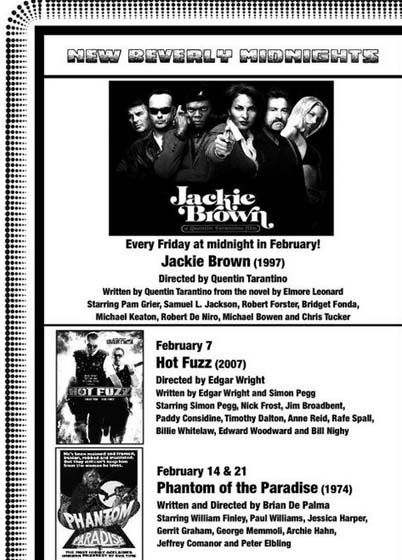 Hold the phone-- after
Hold the phone-- after 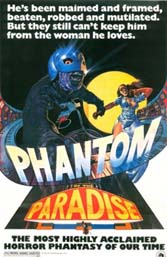 Brian De Palma's Phantom Of The Paradise will screen at
Brian De Palma's Phantom Of The Paradise will screen at